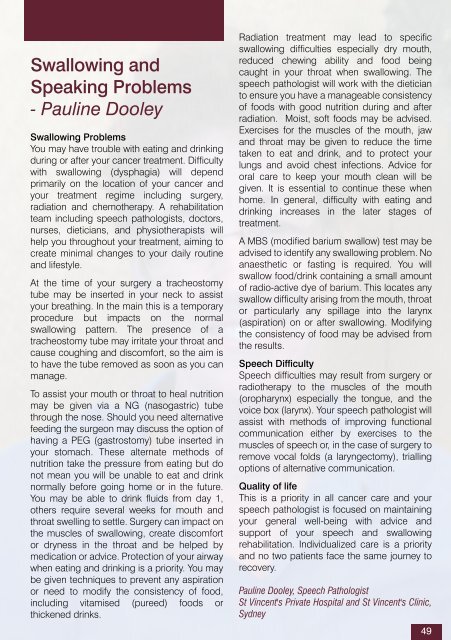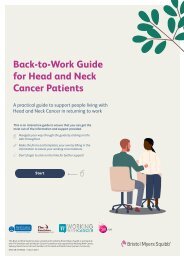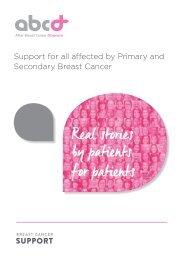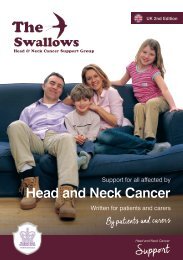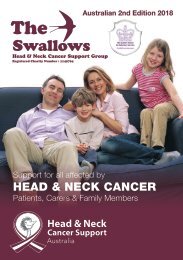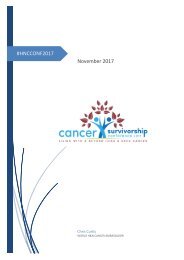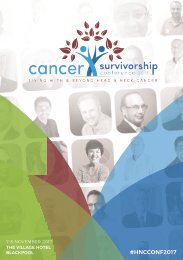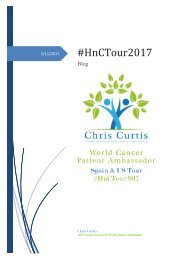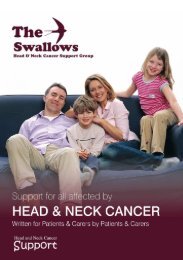The Swallows Australian Edition Magazine
Create successful ePaper yourself
Turn your PDF publications into a flip-book with our unique Google optimized e-Paper software.
Swallowing and<br />
Speaking Problems<br />
- Pauline Dooley<br />
Swallowing Problems<br />
You may have trouble with eating and drinking<br />
during or after your cancer treatment. Difficulty<br />
with swallowing (dysphagia) will depend<br />
primarily on the location of your cancer and<br />
your treatment regime including surgery,<br />
radiation and chemotherapy. A rehabilitation<br />
team including speech pathologists, doctors,<br />
nurses, dieticians, and physiotherapists will<br />
help you throughout your treatment, aiming to<br />
create minimal changes to your daily routine<br />
and lifestyle.<br />
At the time of your surgery a tracheostomy<br />
tube may be inserted in your neck to assist<br />
your breathing. In the main this is a temporary<br />
procedure but impacts on the normal<br />
swallowing pattern. <strong>The</strong> presence of a<br />
tracheostomy tube may irritate your throat and<br />
cause coughing and discomfort, so the aim is<br />
to have the tube removed as soon as you can<br />
manage.<br />
To assist your mouth or throat to heal nutrition<br />
may be given via a NG (nasogastric) tube<br />
through the nose. Should you need alternative<br />
feeding the surgeon may discuss the option of<br />
having a PEG (gastrostomy) tube inserted in<br />
your stomach. <strong>The</strong>se alternate methods of<br />
nutrition take the pressure from eating but do<br />
not mean you will be unable to eat and drink<br />
normally before going home or in the future.<br />
You may be able to drink fluids from day 1,<br />
others require several weeks for mouth and<br />
throat swelling to settle. Surgery can impact on<br />
the muscles of swallowing, create discomfort<br />
or dryness in the throat and be helped by<br />
medication or advice. Protection of your airway<br />
when eating and drinking is a priority. You may<br />
be given techniques to prevent any aspiration<br />
or need to modify the consistency of food,<br />
including vitamised (pureed) foods or<br />
thickened drinks.<br />
Radiation treatment may lead to specific<br />
swallowing difficulties especially dry mouth,<br />
reduced chewing ability and food being<br />
caught in your throat when swallowing. <strong>The</strong><br />
speech pathologist will work with the dietician<br />
to ensure you have a manageable consistency<br />
of foods with good nutrition during and after<br />
radiation. Moist, soft foods may be advised.<br />
Exercises for the muscles of the mouth, jaw<br />
and throat may be given to reduce the time<br />
taken to eat and drink, and to protect your<br />
lungs and avoid chest infections. Advice for<br />
oral care to keep your mouth clean will be<br />
given. It is essential to continue these when<br />
home. In general, difficulty with eating and<br />
drinking increases in the later stages of<br />
treatment.<br />
A MBS (modified barium swallow) test may be<br />
advised to identify any swallowing problem. No<br />
anaesthetic or fasting is required. You will<br />
swallow food/drink containing a small amount<br />
of radio-active dye of barium. This locates any<br />
swallow difficulty arising from the mouth, throat<br />
or particularly any spillage into the larynx<br />
(aspiration) on or after swallowing. Modifying<br />
the consistency of food may be advised from<br />
the results.<br />
Speech Difficulty<br />
Speech difficulties may result from surgery or<br />
radiotherapy to the muscles of the mouth<br />
(oropharynx) especially the tongue, and the<br />
voice box (larynx). Your speech pathologist will<br />
assist with methods of improving functional<br />
communication either by exercises to the<br />
muscles of speech or, in the case of surgery to<br />
remove vocal folds (a laryngectomy), trialling<br />
options of alternative communication.<br />
Quality of life<br />
This is a priority in all cancer care and your<br />
speech pathologist is focused on maintaining<br />
your general well-being with advice and<br />
support of your speech and swallowing<br />
rehabilitation. Individualized care is a priority<br />
and no two patients face the same journey to<br />
recovery.<br />
Pauline Dooley, Speech Pathologist<br />
St Vincent's Private Hospital and St Vincent's Clinic,<br />
Sydney<br />
49


